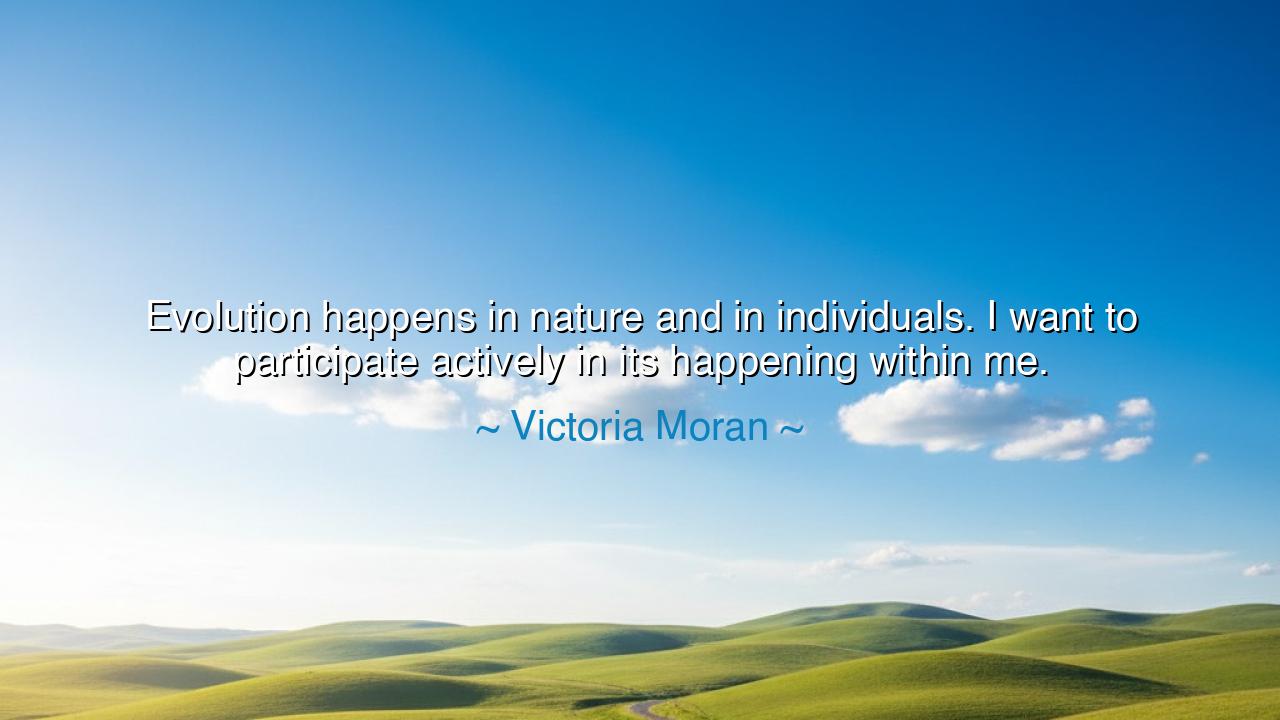
Evolution happens in nature and in individuals. I want to
Evolution happens in nature and in individuals. I want to participate actively in its happening within me.






Hear now the words of Victoria Moran, which echo like a call to the soul: “Evolution happens in nature and in individuals. I want to participate actively in its happening within me.” In this utterance lies not merely a reflection on growth, but a summons to rise above the slumber of passivity. For just as the rivers carve valleys and the seed becomes the tree, so too does the human spirit undergo its own unfolding. Yet unlike the beasts and the stones, we possess a choice: whether to drift with the currents of time, or to embrace with full heart the sacred work of transformation.
In nature, evolution is slow and unseen, measured in the silence of millennia. The mountains rise and fall, creatures adapt and perish, and the forest renews itself in cycles unending. But in individuals, evolution can be swift and fiery, for it is born not only of time but of will. A man may remain stagnant for years, chained by fear and habit, until a single moment of awakening ignites him into a new being. Thus, Moran’s words remind us that evolution is not only what happens to us—it is also what we can choose to make happen within us.
Recall the tale of Siddhartha, the prince who became the Buddha. Surrounded by luxury, he might have lived and died unchanged, cocooned in comfort. Yet he gazed upon sickness, old age, and death, and within him stirred the great desire for truth. His evolution was not merely the passing of years, but the fire of intention. He left his palace, endured hardship, sought wisdom, and emerged awakened. His transformation was proof that the noblest form of evolution arises when one participates in one’s own becoming.
So too in our modern age, when the world urges us toward distraction and passivity, Moran’s words strike like a clarion. Many live as though life happens only to them, waiting for fate to carve their path. But to be human is to carry within us the power to evolve with awareness. We are not merely subjects of nature; we are co-creators of our destiny. To “participate actively” is to claim that power, to live deliberately, and to shape one’s spirit with the same devotion an artist gives to stone or clay.
The meaning of this teaching is both heroic and tender. It calls us to courage, for evolution demands shedding old skins and walking into the unknown. It calls us to humility, for growth often begins with admitting our flaws and wounds. It calls us to endurance, for transformation is no single act but a lifelong path. The individual who accepts this work becomes like the oak that grows through storms—strong not despite the winds, but because of them.
The lesson is thus: do not wait for life to change you; step forward and change yourself. Ask: “Where must I grow? What must I release? What greater self waits within me, like a seed beneath the soil?” Let each trial be fuel for your transformation, each sorrow a teacher, each joy a reminder of what you are becoming. Do not resist evolution, but welcome it as the very heartbeat of existence.
Practical actions may guide this lofty path: begin by cultivating awareness, through silence, through meditation, through honest reflection. Set intentions as one sets seeds in fertile ground. Seek wisdom in the words of the ancients, and companionship with those who walk the path of growth. And most of all, act—do not let your dreams remain thought alone, but embody them in your choices each day. Thus you will not only survive, but evolve, becoming more luminous, more whole, more true.
Remember always: evolution is the law of both nature and the individual. But while the river cannot choose its course, you may choose yours. Take part, then, in the sacred work of your own becoming. Do not merely live—evolve. And in your evolution, you shall become both the student of life and its masterpiece.






AAdministratorAdministrator
Welcome, honored guests. Please leave a comment, we will respond soon